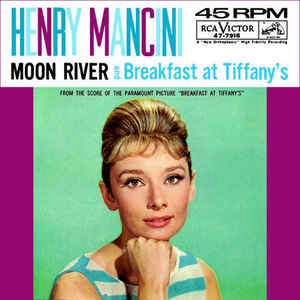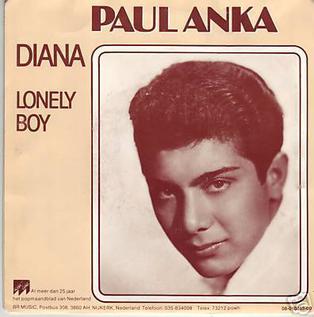Related Research Articles

"Moon River" is a song composed by Henry Mancini with lyrics by Johnny Mercer. It was originally performed by Audrey Hepburn in the 1961 film Breakfast at Tiffany's, winning an Academy Award for Best Original Song. The song also won the 1962 Grammy Awards for Record of the Year and Song of the Year. In 1999, Mancini's recording was inducted into the Grammy Hall of Fame.
Jerry Paul Keller is an American pop singer and songwriter, best known for his 1959 hit song "Here Comes Summer".

"Chantilly Lace" is a 1958 rock and roll song by The Big Bopper. It was produced by Jerry Kennedy, and reached No. 6 on the US Billboard Hot 100. Bruce Channel covered the song on his 1962 album, Hey! Baby. The song was also covered by Jerry Lee Lewis in 1972.

"Beyond The Sea" is the English-language version of the French song "La Mer" by Charles Trenet, popularized by Bobby Darin in 1959. While the French original was an ode to the sea, Jack Lawrence – who composed the English lyrics – turned it into a love song.

"Runaway" is a number-one Billboard Hot 100 song made famous by Del Shannon in 1961. It was written by Shannon and keyboardist Max Crook, and became a major international hit. It topped the Billboard charts for four consecutive weeks, and Billboard ranked it as the No. 5 song for 1961. It was No. 472 on the 2010 version of Rolling Stone's list of the 500 Greatest Songs of All Time and No. 466 on the 2004 version.

"Ramblin' Rose" is a 1962 popular torch song written by brothers Noel Sherman (words) and Joe Sherman (music) and popularized by Nat King Cole. The recording by Nat King Cole reached No. 2 on the Billboard Hot 100 chart in 1962.
"Needles and Pins" is a rock song credited to American writers Jack Nitzsche and Sonny Bono. Jackie DeShannon recorded it in 1963 and other versions followed. The most successful ones were by the Searchers, whose version reached No. 1 on the UK singles chart in 1964, and Smokie, who had a worldwide hit in 1977. Others who recorded the song include the Ramones, Gene Clark, Petula Clark, and Tom Petty and the Heartbreakers with Stevie Nicks.

"Who's Sorry Now?" is a popular song with music written by Ted Snyder and lyrics by Bert Kalmar and Harry Ruby. It was published in 1923 as a waltz. Isham Jones had a hit recording in 1923 with the song arranged as a foxtrot. Later sheet music arrangements, such as the 1946 publication that was a tie-in to the film A Night in Casablanca, were published in 2
2 time. Other popular versions in 1923 were by Marion Harris, Original Memphis Five, Lewis James, and Irving Kaufman.

"Diana" is a song written and first performed by Paul Anka, who recorded it in May 1957 at Don Costa’s studio in New York City. Anka stated in his autobiography that the song was inspired by a girl named Diana Ayoub, whom he had met at his church and community events, and had developed a crush on. Session musicians on the record included George Barnes playing lead guitar, Bucky Pizzarelli playing the "Calypso" riff on guitar, Irving Wexler on piano, Jerry Bruno on bass, and Panama Francis on drums. The song was recorded in May 1957 at RCA Victor Studios in New York. Backup singers included Artie Ripp.

"Stay" is a doo-wop song written by Maurice Williams and first recorded in 1960 by Williams with his group the Zodiacs. Commercially successful versions were later also issued by the Hollies, the Four Seasons and Jackson Browne.

"I Will Follow Him" is a popular song that was first recorded in 1961 by Franck Pourcel, as an instrumental entitled "Chariot". The song achieved its widest success when it was recorded by American singer Little Peggy March with English lyrics in 1963. The music was written by Franck Pourcel and Paul Mauriat. It was adapted by Arthur Altman. The completely new English lyrics were written by Norman Gimbel.
"It's All in the Game" is a pop song whose most successful version was recorded by Tommy Edwards in 1958. Carl Sigman composed the lyrics in 1951 to a wordless 1911 composition titled "Melody in A Major", written by Charles G. Dawes, who was later Vice President of the United States under Calvin Coolidge. It is the only No. 1 single in the U.S. to have been co-written by a U.S. Vice President or a Nobel Peace Prize laureate.
"Let's Get Together", also known as "Get Together" and "Everybody Get Together", is a song written in the mid-1960s by the American singer-songwriter Chet Powers, from the psychedelic rock band Quicksilver Messenger Service. A hit version by the Youngbloods, included on their 1967 debut album The Youngbloods, peaked at No. 5 on the Billboard Hot 100 in 1969.
"Theme From Dr. Kildare" is a song written by Jerry Goldsmith and Pete Rugolo with lyrics by Hal Winn. The song was the theme for the television series Dr. Kildare. The series' lead actor, Richard Chamberlain, released it in 1962 as a single in his first venture into a singing career.

"Tired of Waiting for You" is a song by the English rock band the Kinks. It was released as a single on 15 January 1965 in the UK and on 17 February 1965 in the US. The single reached number one in the UK and number six in the US. It then appeared on their second studio album, Kinda Kinks. It was the group's highest-charting single in the US - tied with "Come Dancing", which achieved the same chart position eighteen years later in 1983.

"Glad All Over" is a song written by Dave Clark and Mike Smith and recorded by the Dave Clark Five.

"Put a Little Love in Your Heart" is a song originally performed in 1969 by Jackie DeShannon, who composed it with her brother Randy Myers and Jimmy Holiday. In the U.S., it was DeShannon's highest-charting hit, reaching number 4 on the Hot 100 in August 1969 and number 2 on the Adult Contemporary chart. In late 1969, the song reached number 1 on South Africa's hit parade. The song rivalled the success of her signature song, "What the World Needs Now Is Love".

"Just One Look" is a song co-written by American R&B singers Doris Troy and Gregory Carroll. The recording by Doris Troy was a hit in 1963. The Hollies, Anne Murray, Linda Ronstadt and Iain Matthews each achieved great success with the song. There have also been many other versions.

"Can't You See That She's Mine" is the fourth single released in the United States by the Dave Clark Five. The song was written by Dave Clark and Mike Smith, and was the Dave Clark Five's fourth Gold Record. The B-side "No Time To Lose" was taken from the previous Dave Clark Five album "Glad All Over".
"Boll Weevil" is a traditional blues song, also known by similar titles such as "Boweavil" or "Boll Weevil Blues". Many songs about the boll weevil were recorded by blues musicians during the 1920s through the 1940s. However, a rendition by Lead Belly recorded in 1934 by folklorist Alan Lomax led to it becoming well-known. A 1961 adaptation by Brook Benton became a pop hit, reaching number two on the Billboard Hot 100. Fats Domino's "Bo Weevil" is a different song.
References
- 1 2 3 Rice, Jo (1982). The Guinness Book of 500 Number One Hits (1st ed.). Enfield, Middlesex: Guinness Superlatives Ltd. p. 44. ISBN 0-85112-250-7.
- ↑ Jerry Keller - Chart History - The Hot 100, Billboard.com. Accessed 18 December 2016.
- ↑ Whitburn, Joel (2004). The Billboard Book of Top 40 Hits: Eighth Edition. Record Research. p. 340.
- ↑ Roberts, David (2006). British Hit Singles & Albums (19th ed.). London: Guinness World Records Limited. p. 103. ISBN 1-904994-10-5.
- ↑ Jerry Keller - Full Official Chart History, Official Charts Company . Retrieved 18 December 2016.
- ↑ Jerry Keller - Here Comes Summer, norwegiancharts.com. Retrieved 18 December 2016.
- ↑ "1050 CHUM – CHUM Charts". Archived from the original on 28 February 2006. Retrieved 19 December 2016.
{{cite web}}: CS1 maint: bot: original URL status unknown (link) Chart Number 119, CHUM. - ↑ "Wildfire Chart History (Hot 100)". Billboard . Retrieved 10 December 2017.